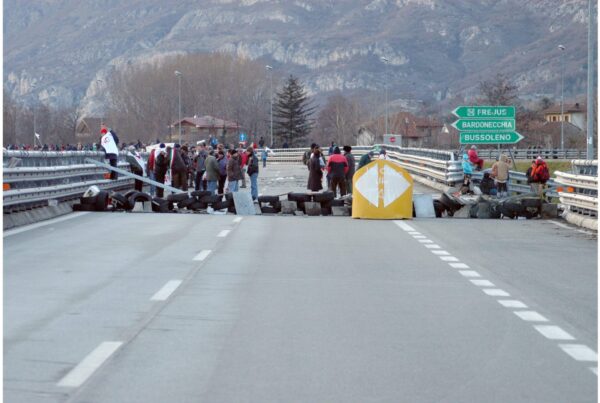by Arianna Tozzi and Seema Kulkarni
What happens when women farmers, civil society organisations, academics, writers, and artists come together to celebrate women in agriculture, amplify their voices, and collectively envision a just and sustainable agrarian future? This article reflects on these themes as they emerged during the second Mahila Kisan Sammelan or Women Farmers Conference in India (May 7–9, 2025, Pune).
In May 2025, a three-day conference on the theme “Women Farmers: Identity, Resilience, Transformation” took place at the University of Pune, India, marking the 10-year anniversary of the Mahila Kisan Adhikaar Manch (MAKAAM – Forum for Women Farmers’ Rights). The conference saw the participation of over 500 women farmers from 17 states alongside civil society organisations, academics, writers, and artists. It celebrated women’s critical role in sustaining agriculture, rural livelihoods, and national food security, while also highlighting the systemic barriers women still face both in public and private domains. These challenges are shaped by entrenched norms around gender roles and compounded by limited access to land and other resources, experienced at the intersections of caste, class, and other axes of social inequalities.
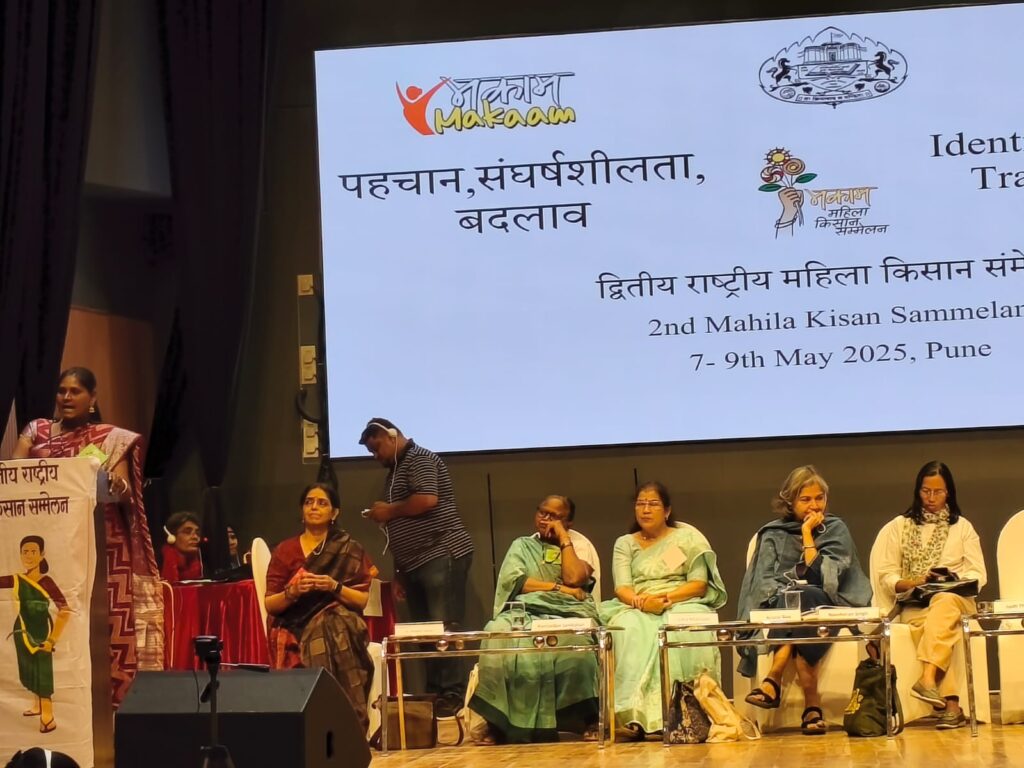
Jyoti Thorat a sugarcane worker speaking at the opening plenary at the Mahila Kisan Sammelan, Pune. Photo Credit: MAKAAM.
Focusing on women farmers and their identities, the conference denounced the exclusionary definition of a farmer adopted by state policies and programs which narrowly identifies farmers with landowners. This approach is misguided, ignoring the structural obstacles women face and which prevent them from being legally recognised as owners of the land. The most recent and widely cited estimate suggests that while 73.2% of rural women are engaged in agriculture, only 12.8% of them have land registered in their names. Recognising these inequalities, the conference called for a broader, more inclusive definition of “farmer,” in line with the National Policy for Farmers (2007), which identifies as farmers not only landowners but also cultivators, labourers, sharecroppers, fisher people and tenants. This reframing recognises the centrality of women’s labour and that of indigenous and marginalised communities – whether in the fields, forests, livestock-rearing, fisheries, or at home – and which remains largely unrecognised, undervalued, and unpaid.
The conference focussed on four thematic strands, including Organizing for Realizing Rights of Women Farmers, Denouncing Structural violence against women in Agriculture, Forests Rights Governance and Commons, and Feminist Approaches to Agroecology.
Towards Feminist Agroecology
Agroecology was a central topic of the Sammelan. Advancing ongoing debates around the convergence between feminist political ecology and agroecology, participants reflected on the opportunities for a transition to agri-alternatives as a way to address India’s agrarian crisis and its gender dynamics. This crisis is multifaceted — rooted in economic, social, and environmental factors—and has disproportionately impacted small and marginal farmers. Its origins are often traced to the Green Revolution of the 1960s/70s, which prioritised monocultures of high-yielding crops (mainly wheat and rice), chemical inputs, and large-scale irrigation investments. These changes came at the expense of rainfed areas, local food varieties, and indigenous knowledge systems.
The resulting shift towards industrialised agriculture has weakened the livelihoods of marginalised communities (particularly Adivasis and Scheduled Castes) with women farmers disproportionately bearing the brunt. Their labour has often been displaced by mechanisation, and their traditional knowledges — such as on mixed cropping, seed conservation, and agroecological practices — has been sidelined. In response, agroecology has emerged as a counter-movement that challenges corporate control over food systems and advocates for ecological sustainability, local food sovereignty, and social justice.
However, many agroecological initiatives still treat gender superficially, relegating women to the role of passive beneficiaries rather than agents of transformation. Without addressing the deep structural inequalities embedded in the current agri-food system, such approaches risk reproducing the very injustices they aim to overcome. The conference thus posed some critical questions: What would a truly gender-transformative approach to agroecology look like? And what role can civil society organizations play to advance a more gender-just pathway for agroecology?
Feminist approaches to agroecology were identified as a way forward. These can be described as approaches that promote a transition to an alternative paradigm of agriculture by addressing the unequal power relations that marginalises women within the present agri-food system and that mobilises agroecology to achieve both social and environmental justice.
Seeds of Sovereignty: Feminist Agroecology in Practice
One of the most tangible expressions of feminist agroecology at the conference was a “Seeding Futures” Seed Fair. Here, women farmers from MAKAAM-affiliated collectives and community-based organisations showcased their seeds and agroecological produce to participants and the public. Around 20 groups from states including Uttarakhand, Gujarat, Maharashtra, Odisha, Tamil Nadu, Telangana, Andhra Pradesh Karnataka, and Kerala participated — highlighting the incredible socio-ecological diversity of agroecological systems across India.

Seed Stall of Self Reliant Farmers from Akola district in Maharashtra. Photo credit: Seema Kulkarni.
The displays featured deshi (indigenous) seed varieties of rice, millets, wheat, vegetables, and medicinal herbs, alongside processed products like millet snacks and papads. Gender-sensitive farming tools, and informational materials on the benefits of agroecology-based farming were also on display.
Savita Nayak, a women farmer, commented on her experience: “I am from the Raskum Mahila Farmer Producer organisation and have brought several products from my district in Gujarat. Mahula seeds, and various products from Ragi as well. The sammelan and this seed festival has been a great experience for me”.
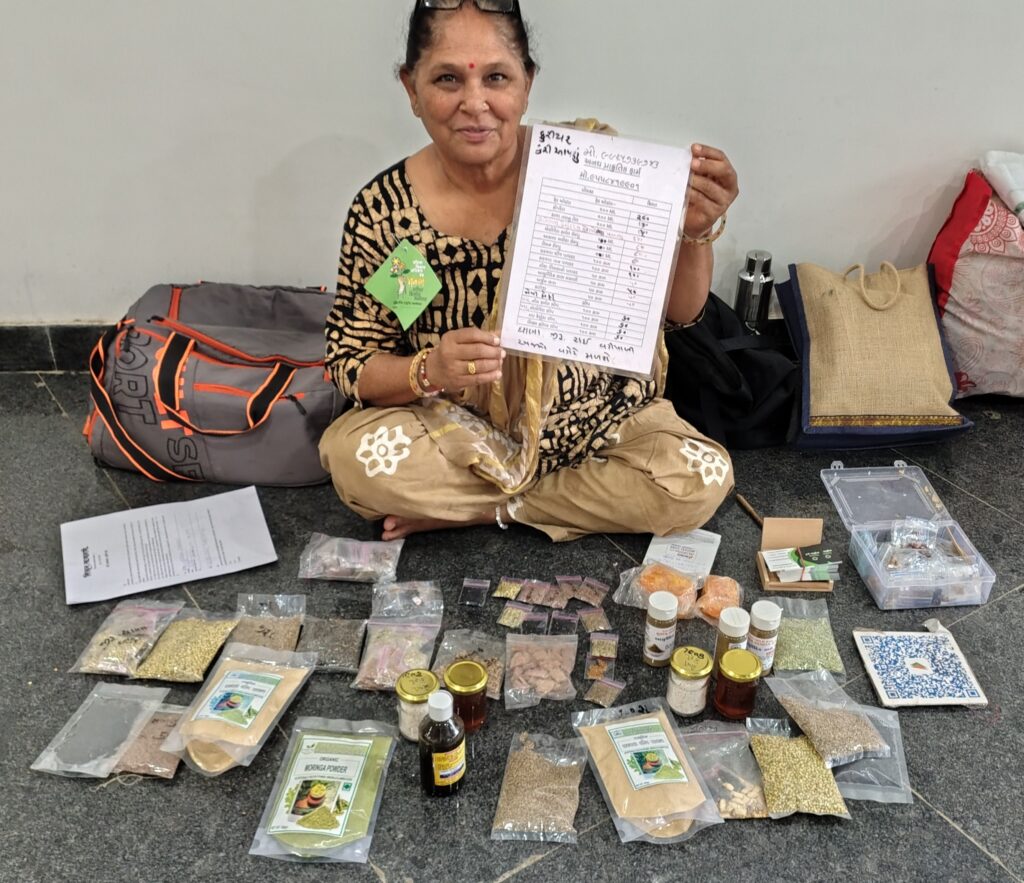
Geeta Ben Patel, SWATI, Surendranagar district, Gujarat. Photo Credit: MAKAAM.
Adivasi communities—India’s Indigenous peoples—were prominently represented. Women from Particularly Vulnerable Tribal Groups (PVTGs) in the Raigad district of Maharashtra shared seeds of Kadave Val, a rare, protein-rich pulse native to the region, prized for its unique taste and popularity in urban markets like Mumbai and Pune. The fair also highlighted the value of uncultivated vegetables, which have long supported the nutritional and medicinal needs of tribal communities. While chemical pesticide use has led to the decline of these plants, agroecological practices are helping to restore them.
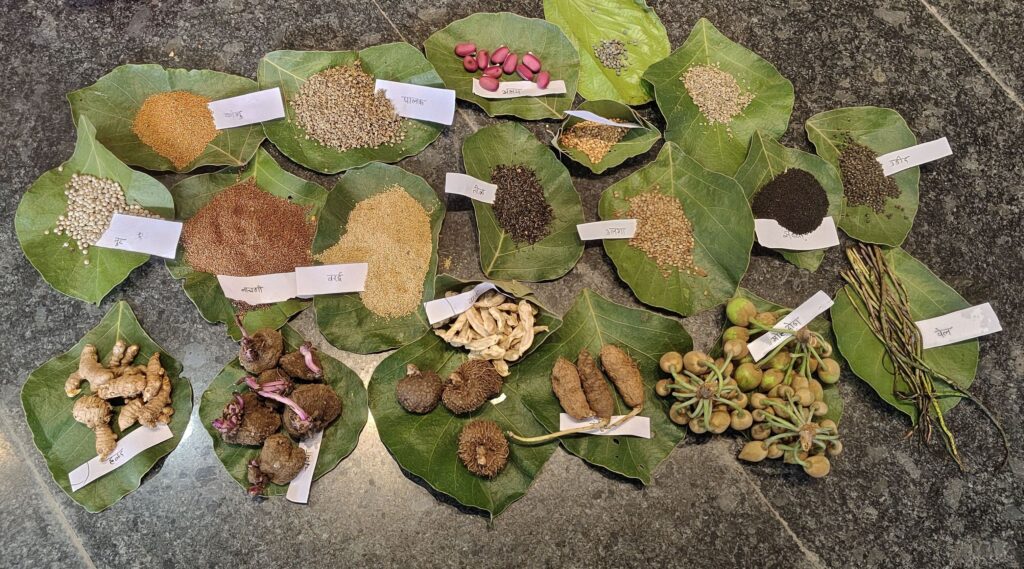
Diverse Seed Varieties from Raigad district of Maharashtra. Photo Credit: Sonali Wagh.
Dalit women—historically among the most marginalised castes—also took centre stage. A group of Dalit women sugarcane workers displayed their efforts to reclaim common land for agroecological farming. By cultivating these lands, they aim to reduce their dependence on exploitative seasonal migration for sugarcane harvesting — labour often linked to health risks, discrimination, and gender-based violence.
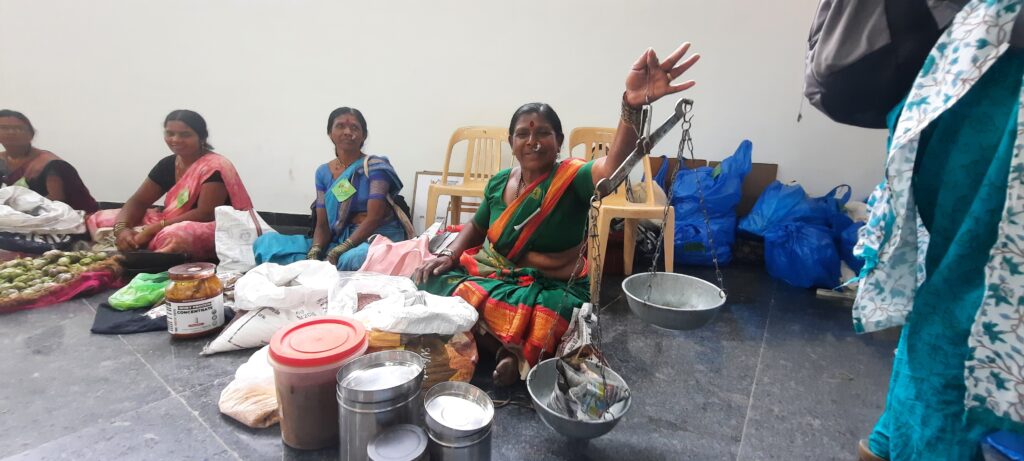
Seed Stall of Self Reliant Dalit Farmers from Beed district in Maharashtra. Photo credit: Vanita Tumsare.
Hira Routella, MAKAAM’s National Facilitation Team member shared her reflection on the Seed Fair: “I really liked seeing the enthusiasm of women from different regions. The women have dedicated themselves to preserving traditional seeds. Their knowledge about traditional crops and their scientific approach to seed conservation is truly fascinating”.
Challenges ahead and calls to action
Despite its promise, feminist agroecology faces major challenges—particularly around the question of added labour and caring responsibilities. Agroecological methods require more time and work in managing seeds, soils, and biodiversity. This added workload often falls on the shoulders of women, who are already burdened with unpaid domestic and care responsibilities. The resulting “double burden” risks restricting their time and reducing their participation in leadership or decision-making roles. The feminisation of agroecological labour without corresponding recognition, compensation, or redistribution of care work risks entrenching gender inequalities rather than alleviating them and this is a key challenge and concern for gender transformative agroecology going forward.
The concluding declaration from the conference reiterated the commitment to establish a gender-transformative agroecology framework as a new paradigm of farming. To this end, MAKAAM is collaborating with the National Coalition on Natural Farming and the Revitalising Rainfed Agriculture Network to develop a set of principles and an actionable five-year plan. This effort seeks to sensitise agroecology practitioners and policymakers alike to both the transformative potential and the gender barriers embedded within the current systems.
Acknowledgements
The Seed Fair was supported by a Catalyst Fund grant from the University of Manchester as part of its Social Responsibility Programme. We also thank the Society for Promoting Participative Ecosystem Management (SOPPECOM), Pune for their support in organising the Conference.
The blog post is also part of the Feminist Agroecology Network, a grassroot-informed platform that brings together scholars, activists and practitioners working on regenerative agriculture and processes of agrarian transformations through feminist and decolonial approaches. If you are interested in joining the conversation, you can sign up by sending an email to: [email protected].
Image on top: The Sammelan Declaration – Young and Old Resolve to be in this together. Photo credit: Kavitha Kuruganti.




